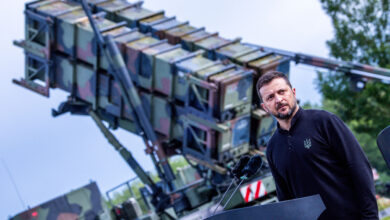General Atomics awarded $123 million Netherlands MQ-9 Reaper drone contract
General Atomics Aeronautical Systems was awarded a $123 million contract for four MQ-9 Reaper drones for the Netherlands, the U.S. Department of Defense said in a release.
The not-to-exceed $123,293,911 contract (FA8620-19-F-2310) provides for four MQ-9 Block 5 unmanned air vehicles, four Mobile Ground Control Stations, spares, and support equipment, the Thursday, March 22 release said.
Work is expected to be complete by December. 31, 2020.
The U.S. State Department approved the sale of Reapers in 2015. Estimated at the time at $339 million, the proposed sale included four aircraft, four ground stations, six engines, General Atomics’ Lynx synthetic aperture radar with Maritime Wide Area Search capability, targeting systems and other equipment.
It also included spares and readiness packages to support 3,400 flight hours over three years, as well as training and other services.
After being postponed in 2015, the Letter of Offer and Acceptance for the sale was signed at the Farnborough Air Show in July 2018.
Royal Netherlands Air Force crews consisting of a pilot and sensor operator have been training at Holloman Air Force Base in New Mexico since December. The first two Dutch crews flew the aircraft in January and they are expected to graduate in May.
The RNLAF Reapers will be assigned to 306 Squadron based at Leeuwarden Air Base in the northern Friesland province and are expected to be operational in 2020. The squadron, established in 1953 as a photo reconnaissance unit, was deactivated in 2010 but reactivated in 2018.
Launched in 2001, the MQ-9 Reaper was the first remotely-piloted unmanned aerial vehicle designed for medium-altitude long-endurance missions and can operate autonomously for both intelligence, surveillance and reconnaissance missions and precision strikes. The Block 5 version first flew in 2012.
The Reaper is used by the U.S. Air Force and Department of Homeland Security, NASA, and the air forces of France, Italy, Spain the United Kingdom. Australia, Belgium and India have plans to acquire variants of the drone.












